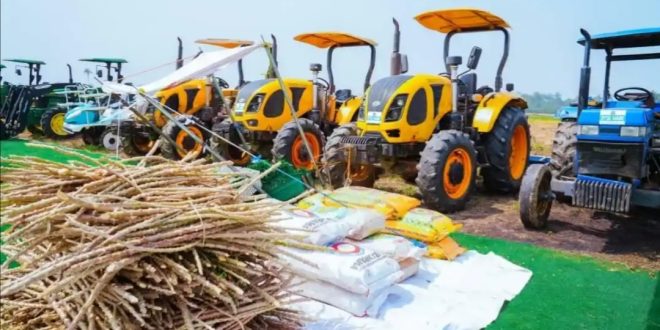By Ekpenyong Emmanuel
Bayelsa State’s rice production has received a significant boost with the installation of modern rice processing mills by a technical team from the Republic of South Korea. The state-of-the-art mills, which have a capacity to process 40 metric tonnes of rice paddies per day, were installed at the state-owned School-to-Land Farm in Yenagoa, the state capital.
The installation of the mills is a result of the bilateral relationship between Bayelsa State and the Korean government, which has provided technical support and donated farming equipment to the state. The Korean team, led by Mr. Byung Chul Son, Managing Director of Delta Sung Machinery and Construction Company Limited, worked with the state Ministry of Agriculture to train staff in soil preparation, land irrigation, rice cultivation, and milling.
According to Bayelsa State Commissioner for Agriculture and Natural Resources, Prof. Beke Sese, the South Korean government donated four units of rice mills with a production capacity of 10 tonnes per day each. This brings the state’s total rice production capacity to 40 tonnes per day, a significant increase from the previous 3 tonnes per day.
The commissioner expressed optimism that the new mills would enable the state to meet its target of one million tonnes of rice production annually. “With the four units of 10 tonnes per day, we now have a combined 40 tonnes per day rice production mills. That means there will be an exponential increase in our rice production,” he said.
Bayelsa State Governor, Senator Douye Diri, has also expressed gratitude to the Korean government for the donation and technical support. He stated that his administration is committed to strengthening the bilateral relationship between the state and the Korean government in the area of agriculture.
Governor Diri noted that Bayelsa has huge potential for rice cultivation, but the state still purchases rice. He said that his government decided to engage with the Korean government to benefit from the Korean International Cooperation Agency (KOICA) programme, which supports sustainable development in developing countries.
The governor urged the Korean engineers to explore the possibility of providing more technical support in training the state’s engineers to manufacture tractors and other farming equipment. This, he said, would help to reduce the state’s reliance on imported equipment and create jobs for the youth.
With the installation of the new rice mills, Bayelsa State is poised to become a major rice-producing hub in Nigeria. The state’s rice production is expected to increase significantly, providing a boost to the local economy and creating opportunities for farmers and other stakeholders in the rice value chain.
 National Telescope national telescope newspaper
National Telescope national telescope newspaper



